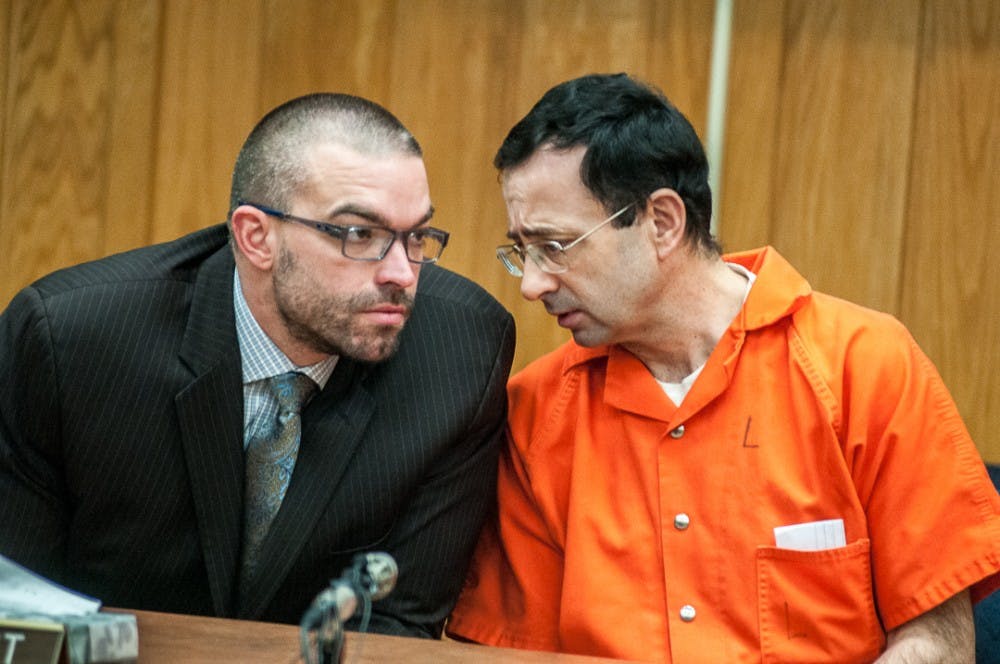Ex-MSU and USA Gymnastics doctor Larry Nassar, sentenced in three separate cases to at least 100 years overall, likely won’t see the outside of a prison for the rest of his life.
But Nassar’s imprisonment isn’t stopping politicians across the nation from pushing to find out how Nassar was able to continue abusing at least 265 women and girls for more than two decades. Policymakers are using a variety of tactics — including inquiries, investigations and legislation — to shine a brighter light on MSU and the U.S. Olympic Committee to prevent a repeat of the Nassar situation.
State representatives Klint Kesto and Kim LaSata sent a letter of inquiry to MSU on Jan. 25, seeking information about the university’s handling of sexual assault allegations against Nassar.
In the letter, Kesto and LaSata, who chairs the House Appropriations Subcommittee on Higher Education, requested all reports “initiated, completed or issued” by MSU from 2014-17 regarding allegations made against Nassar. The pair originally requested the information be provided by Feb. 9, but later extended the deadline to Feb. 14. MSU provided more than 1,300 pages to the Michigan House of Representatives by the deadline.
Kesto said they were willing to give MSU more time because he believed the university was acting in good faith, since the university reached out about an extension ahead of the deadline.
Kesto also indicated he understood the current administrative upheaval at MSU was likely complicating matters, so the extension was granted.
“They indicated that they wanted to cooperate, but just needed a few more days to provide all the additional information,” Kesto said. “Additionally, they did have a new president, so that kind of was a new wrinkle in there.”
Kesto said the next step will be to analyze the documents to determine what went wrong after the 2014 Title IX investigation that cleared Nassar of any wrongdoing.
In addition to the inquiry, Kesto is also drafting legislation that would bar public colleges and universities from using taxpayer money to settle lawsuits regarding sexual assault allegations.
“We have to protect taxpayers by ensuring not a single dime of state funding sent to Michigan State University is used as part of a settlement with these unfortunate victims,” Kesto said in a release.
On Feb. 12, the Michigan House Progressive Women’s Caucus, or PWC, announced a set of principles aimed at combating sexual assault on college campuses, with a focus on prevention, protection and accountability.
The caucus called for a strengthening of Title IX resources and increasing the statute of limitations on cases of sexual assault.
“The principles are aimed at combating campus sexual assault, and those principles will guide legislation for the Progressive Women’s Caucus as they work on this issue in the coming months,” said Samantha Hart, communications director for the House Democratic Caucus. “Some of that legislation has been introduced, and some will be introduced over time.”
One of the bills that has already been introduced would address PWC’s goal of extending the statute of limitations on sexual misconduct.
Sen. Steven Bieda, D-Warren, introduced a bill that would eliminate the statute of limitations for second-degree criminal sexual conduct in which the victim was under 16 years of age.
Also in the bill is a provision to extend the statute of limitations on third-degree criminal sexual conduct offenses to 20 years or the victim’s 31st birthday, whichever comes later.
The bill, which passed in the Senate in October 2017, currently sits in the House Committee on Law and Justice, a committee chaired by Kesto.
Nassar was convicted on charges of first-degree criminal sexual conduct, a crime not addressed by the bill in its current state — likely because Bieda said he’s been working to craft the bill since before Nassar’s crimes were exposed.
He said there were no concrete plans to modify the bill to include first-degree sexual crimes, but that the topic was likely to come up as the bill continues to be discussed.
“There’s a lot of interest in (the bill); a lot of thele interest comes out of the Nassar case, of course,” Bieda said. “But this is something that I had been working on for several years prior to the Nassar case coming out."
Support student media!
Please consider donating to The State News and help fund the future of journalism.
Bieda said there needs to be systematic changes in how organizations address sexual assault, as responses to abuse by entities from MSU, to Penn State, to the Catholic Church have failed to help the survivors of these "unconscionable situations."
"The sense I get is almost one of disbelief in how these things have been handled, and certainly minimizing what had happened to the victims in these cases," Bieda said.
The legislative response to Nassar's 20-plus years of abuse is not limited to the state of Michigan. Policymakers nationwide have been calling for institutional changes in the wake of Nassar's sentencing.
Sen. Kirsten Gillibrand, D-N.Y., petitioned the Justice Department to investigate the U.S. Olympic Committee over its handling of Nassar's abuses, while Sens. Jeanne Shaheen, D-N.H., and Joni Ernst, R-Iowa, have called for a similar investigation to be conducted by a special congressional committee.
In addition, all three legislators have requested the resignation of Olympic Committee CEO Scott Blackmun. Blackmun said in a letter obtained by the Associated Press that he was not aware of the allegations against Nassar before law enforcement got involved.
On Jan. 30, Congress overwhelmingly passed a bill requiring amateur sports organizations to report sexual abuse allegations to law enforcement within 24 hours. The bill, which passed on a 406-3 vote in the House and unanimously the Senate, awaits a signature from President Donald Trump to be enacted into law.
Discussion
Share and discuss “In light of Nassar scandal, legislators push to prevent repeat ” on social media.







